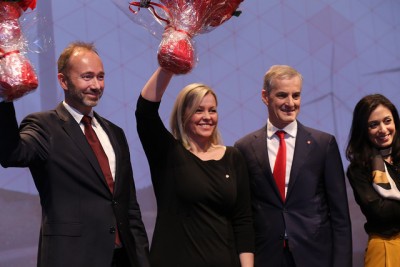Norway’s Labour Party, and its former deputy leader Trond Giske, may finally be emerging from a string of crises in recent months. Labour logged the single-biggest gain in a new public opinion poll released this week, indicating a majority of current voter support for the left-leaning coalition in Parliament for the first time since last December.

The jump in the polls comes just as Labour’s shamed Giske also seems to be rebounding from sexual harassment charges against him last winter. Giske was stripped of all party posts after a string of women filed complaints about his behaviour during the height of the international “MeToo” campaign that exposed harassment around the world.
Last weekend, however, the annual meeting of Labour’s important chapter in Giske’s home district of Trøndelag gave him a new position that involves preparation of a so-called “idea network” aimed at reviving Labour as a “generous” party that “listens to folks,” firmly planted on the left side of Norwegian politics.
Giske gains ‘special responsibility’
“The board decided that he (Giske) will have a special responsibility to help the board make this project concrete, through its contents, organization, financing etc,” Anne Marit Mevassvik, county leader for Labour in Trøndelag, told newspaper Dagens Næringsliv (DN). She called Giske “Trøndelag Labour’s most experienced politician,” adding that “it’s completely natural that we use him in an area where he has a lot of knowledge.”
Mevassvik didn’t want to respond to questions about whether she sees any problems with Giske regaining such a position so soon after the harassment complaints against him. Labour Party leader Jonas Gahr Støre had earlier claimed Giske would not be re-appointed to any party posts although he retains his seat in Parliament as an elected official. The Trøndelag chapter’s ongoing support for Giske thus left Støre with some explaining to do.
“I have said that it must be possible to win back confidence, and that in cases where there has been a violation of party guidelines, it should take some time before you get any new roles in the party organization,” Støre told DN. He said he thought it was “okay,” however, that the Trøndelag chapter wants Giske “to contribute to their project.”
Leadership challenges
Kjersti Stenseng, who holds Labour’s top administrative post as party secretary, was quick to support Giske’s new position, addressing him from the speaker’s podium at the party meeting over the weekend and saying that “we need your experience and wisdom. It fills this party secretary’s heart with joy that Trøndelag shows this kind of support.”
Stenseng told local Trondheim newspaper Adresseavisen that she also sees “a special role” for herself as representing “the new leadership on the left side of Labour.” She confirmed she wants Labour to have a “clearer profile on the left,” adding that she’s concerned about “frustration around distance to power” along with district- and agricultural policy, statements likely aimed at appealing to leftist coalition partners like the Center Party, which champions subsidy and protection for farmers, and the Socialist Left party.
Støre has long been placed on the right, or more moderate, side of Labour, suggesting that all the posturing going on now indicates what many commentators view as an ongoing power struggle within Labour. Støre tried to downplay that: “I totally agree with Stenseng that those of us in the party’s leadership must take frustration and commitment seriously. On that issue, the party leadership is of course on the same track.”
Støre himself has lately dropped his flirt with Norway’s centrist parties like the Christian Democrats and tried to place Labour more firmly on the left. He came under harsh criticism, however, for not only going along with but actively supporting the conservative government’s decision to join the new EU energy union, albeit after some compromises on both sides. That infuriated many grassroots Labour voters around the country who fear the energy union will strip Norway of sovereignty over its own natural resources and pricing of the energy they create.
Labour union officials also fear the Labour Party will “bleed” in next year’s local government elections, because of voter anger over the energy union and other issues such as rising property tax imposed by most all Labour-led municipalities around the country. Some local officials don’t even want Labour party leaders to come and speak at upcoming celebrations on Norway’s May 1st Labour Day holiday.
Polls indicate renewed voter support
Public opinion polls showed Labour with only around 23 percent of the vote as late as March. This week, however, the party claimed 25.2 percent of the vote in the latest poll conducted by research firm Norstat for Norwegian Broadcasting (NRK). Its gain of 1.9 points came at the expense of the ruling Conservatives, which fell 2.3 points to land at 25.1 percent of the vote even while its annual national party meeting was being held with a confident Prime Minister Erna Solberg reaching out to party members and voters.
The Progress Party, one of the Conservatives’ two government partners, helped offset the loss of voter support with a 0.8-point gain to 15.8 percent but it was mostly negated by a 0.6-point loss of voter support for the other coalition partner, the Liberals, which fell back below the 4 percent level needed for full representation in Parliament.
The most left-leaning party in Parliament, the Reds, also gained to claim 3.8 percent of the vote, more than either the Liberals or the Christian Democrats, which both landed at just 3.7 percent of the vote. The Socialist Left Party gained as well, up half-a-point to 7.5 percent in the NRK poll, while the Center Party fell to 10.7 percent of the vote, down by 1.6 points.
newsinenglish.no/Nina Berglund

